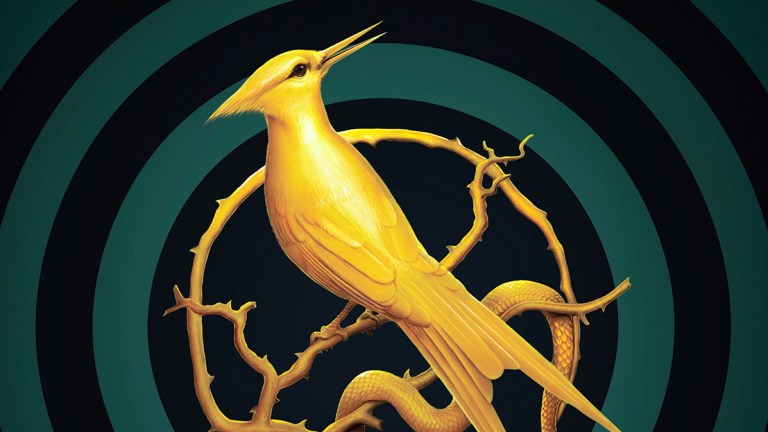The Ballad of Songbirds and Snakes Review (Spoiler-Free)
Suzanne Collins’ villain-centric prequel, The Ballad of Songbirds and Snakes, lacks the melody and the bite of The Hunger Games.

Among the many genre-busting worldbuilding details of Suzanne Collins’ The Hunger Games series, the character of President Coriolanus Snow has proven to be a rather unforgettable villain. In the whole of dystopian YA, few baddies contain as many disturbingly specific details as the elderly yet vicious President of Panem: His obsession with roses, less for the symbolism of their petals’ blood-red color than for their grisly perfume, which mask the scent of blood on his breath. The blood comes from ulcers in his mouth, caused by a lifetime of drinking poison—at first unwittingly, and then intentionally, challenging would-be assassins by ingesting it and living anyway. There’s also the plastic surgery that gives him his oddly full lips, a creepy attempt at imitating youth when he so clearly reeks of death.
But that’s The Hunger Games’ Snow. The 18-year-old Coriolanus whose perspective drives The Ballad of Songbirds and Snakes bears little resemblance to his older self—and not in a good or narratively interesting way. When Collins’ standalone prequel was announced, there was some controversy over the decision to relate the history of the Hunger Games through one of its deadliest citizens, for fear of retroactively humanizing a sociopath. Instead, this overlong tome reintroduces a blandly loyal son of Panem, who fails to become either a sympathetic hero or a compelling antihero, in a surprisingly uneventful origin story.
Readers hoping for a clear line from curly-haired pretty-boy student to Katniss Everdeen’s grotesque nemesis will be disappointed. The book spans only a year of Snow’s life—an auspicious one, to be sure, as it includes the tenth Hunger Games. A child when Panem’s Dark Days against the rebels concluded with the establishment of the first brutal Games, Coriolanus has grown to young adulthood smugly secure in this world order. To avoid a return to the war that killed both his parents and nuked his family fortune, our narrator has decided that these district children deserve to rip one another to death in an arena while the hoi polloi watch.
But what Coriolanus’ fellow students don’t know is that he’s closer to the tributes than they realize. The Snow family is poor. As in, eating-cabbage-soup-for-breakfast poor. One-new-tax-bill-away-from-eviction poor. Yet even as he struggles to save face at school, Coriolanus clings even more to the Games as an arbitrary decider of moral certitude: he will never have to enter the arena, ergo he is still better than the 24 children selected to kill each other every year. No need to worry about a humble villain becoming a problematic protagonist, even as we learn in the opening pages that his cousin is none other than Tigris, the fan favorite rebel sympathizer from Mockingjay. It’s more of an Easter egg for readers than a point in Coriolanus’ favor.
Honestly, the Games themselves go through more character development than Snow does. At the start of Ballad, they still take place in an arena that used to house the circus; none of the Gamemakers have yet mastered the virtual reality technology that will provide shifting biomes and tons of mind games. It’s a grimmer affair for the Capitol’s spectators, too, who will be chastised if the nauseating spectacle makes them throw up their lunches—they are, after all, less than a generation out from wartime rationing—in contrast to the partygoers Katniss witnesses forcing themselves to vomit just for the pleasure of eating again. Panem is still finding its way, but it seems to find a more satisfying answer than Coriolanus himself does.
To commemorate a decade of questionable retribution, Panem’s Gamemakers have decided on a fun new twist: mentors! What’s more, the ones coaching the tributes will not be former victors, but instead Coriolanus and his fellow rich, out-of-touch high-school seniors—and whoever’s tribute wins, that mentor gets a free ride to the University. Snow is already despairing that he has been assigned the girl from District 12, the tribute with the least fighting chance… and then he hears Lucy Gray Baird, with her rainbow dress and affection for snake pets, sing.
Wait. Sixty-four years before Katniss Everdeen will change the Hunger Games forever, there’s another scrappy girl from District 12 challenging everything that Panem has come to expect from its tributes and capturing Coriolanus Snow’s attention? Hmmm.
The portions of the novel dissecting the tenth Hunger Games, in all of its ambitious experiments and flawed tweaks, are the most compelling. Snow warming to his role as mentor, slowly falling for the cunning tribute from 12 even as he brainstorms insidious new dimensions for the arena, evokes Catching Fire’s brand of storytelling: take the detailed narrative blueprints that the readers have memorized, then completely invert them. When Coriolanus listens to Games architect Dean Casca Highbottom and sociopathic Gamemaker Dr. Volumnia Gaul ponder the best muttation to unleash on these poor kids, or how to arrange the new betting system, Collins briefly resurrects the stunning cruelty that made her original trilogy so chillingly readable.
Unfortunately, there’s little real payoff to any of it. The Games still have a long way to go before they are the nightmarish ordeal that Katniss and Peeta experience. The subplot in which a number of mentors seem to get picked off before the Games—almost like Panem itself is its own deadly arena!—falls short of biting social commentary. And Lucy Gray amounts to little more than a Manic Pixie Dream Tribute, especially as The Ballad of Songbirds and Snakes (the title inspired by her, naturally) pivots to a head-scratching third act that has little real impact on Collins’ overall world—nor, seemingly, on Snow’s eventual rise to power.
Easter eggs concerning Tigris, mockingjays, and “The Hanging Tree” song do not make up for plodding through the book equivalent of a moral compass spinning wildly out of control.
Despite the narrative ground covered, and the myriad of social classes through which Snow climbs over the novel’s one-year timeline, he comes out at the end not so much changed as cemented in his elitist beliefs. To have set up such a distinctive character, and then not have delved into the origins for the plastic surgery and the up-yours self-poisoning—there’s even a climactic scene involving a snake!—seems the ultimate wasted opportunity. What’s the fun in exploring a villain’s backstory if we don’t get to the best parts?
